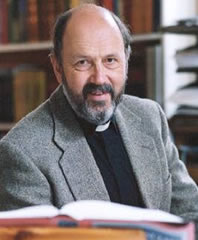Bishop Tom Wright: There should be no division between Church and Politics

Bishop Tom Wright called for theology and politics to reunite in a "cruciform theocracy" last night at St Paul's Cathedral, and for Christians to engage in Jesus' "kingdom project".
"The Gospels tell the story of how the cross wins the victory of the kingdom, the messianic kingdom. Of how the kingdom came and comes not like the manner of earthly kingdoms but in a different way altogether," Wright said, calling for a 'cruciform theocracy' and rejecting the post-enlightenment division of church and state.
Since the enlightenment, the West has seen the world in dualistic terms, splitting heaven and earth, forcing the Gospels into the wrong framework, Wright said.
He suggested that the Church's collusion with secularism has enabled the message of the cross to shift "from the ultimate victory over the principalities and powers, to simply the mechanism of dealing with individual sins."
Jesus came "to inaugurate God's sovereign saving rule of Earth as it is in heaven by means of the cross," which Wright said caused "the modern world and much of the modern church to rebel and recoil."
The post-enlightenment framework has led to the gospel message increasingly becoming means for personal salvation stories, which "have their place, but are not enough and miss the big picture."
Wright said "[Jesus] was not preaching a new 'religion' nor was he telling people the secret of how to get to heaven after he died. Not about how we can get to heaven, but about how heaven's rule can come to earth.
"Not just a protest movement, although there is a new energy and sense of direction for a good deal of protest.
"Nor just a way of reordering a private mentality, although will indeed turn you upside down, some of which will be comforting, some will be very uncomfortable.
"He came to institute God's rule on earth, theocracy."
He emphasised that personal salvation and social action are both true out workings of the gospel, but when taken independently "distort" it.
"The point is that with Jesus something happened because of which the world is a different place. It isn't different how we might want or expect, but something happened because of which it makes vital new sense to talk of new creation, new temple, new humanity and not just to speak of it, but to live it. To hear the call of Jesus right now to be part of kingdom project."
To illustrate, Wright suggested that if you asked a member of the public "what Jesus had to say into today's world" they would be likely to quote Mark 12:17, suggesting a great divide between church and politics.
The irony, he said, was that when Jesus made this statement, he was making almost the opposite point. "When you put it in context, it is anything but a mandate for church/state split." It is admitting that Caesar has a legitimate claim to the coin, but that God's image in every human being trumps all other claims of authority.
"When Jesus talks of Kingdom of God, he really did mean that this was the time for God to become King and reign in a way that not only challenges Caesar's kingdom but challenges Caesar's type of kingdom."
Wright warns that we have read modern dogma into the story, distorting it and missing the point that, in fact, "the whole meaning of God's kingdom is about the one true God calling time on the world's wicked empires and setting up a radically different empire instead."
"[While] the rules of this world do [kingdom] one way, we will do it another way because the Son of Man came not to be served but to serve and to give his life for the ransom of many.
"The Kingdom is power stood on its head."
The implication for today is an inaugurated eschatology – something that will happen at the end of time began to happen through Jesus' ministry, death and resurrection; that the world is radically different because of it.
"Western enlightenment hated that message, because its own claim is that nothing really happened with Jesus' coming except the creation of new religious options and that the real turning point was in the 18th Century with science and technology and western democracy."
Speaking into the current political situation, Wright suggests that that clash stands behind our struggles today.
"Science is a gift from God, but it is not the Kingdom. The problem is that the West has bought so deeply into the narrative of the enlightenment and then can't understand what has gone wrong when the tragedies of this world literally wash up on our shores."
In response to the refugee crisis, he calls for us to return to the Gospel narrative, rather than the post-enlightenment one, in which the poor are prioritised:
"The Gospel vision of the world under the general and wise rule of Jesus; read Psalm 72 if you want the biblical vision of human rule where the needs of the poor and the helpless are the absolute priority, and then look at Jesus doing exactly that."











